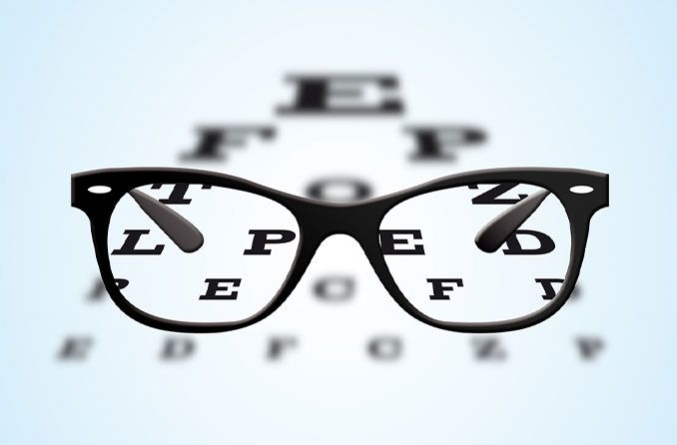Insurance. It's not a very exciting topic, and you may feel your eyes glazing over as you begin to read this article, but it's important to have a basic understanding of your benefits. After all, you pay for them. Hopefully, this post will help you gain a little clarity when it comes to choosing and utilizing your vision benefits.
Routine Vision Insurance vs. Medical Insurance
What is the difference between routine and medical vision claims and does my medical insurance cover my eye exam?
The short answer is, that depends. If you wear glasses or contacts to correct your vision, but your eyes are otherwise healthy, your exam is considered to be a "routine" eye exam and is not covered by your medical plan. If you are being treated for a disease of the eye such as macular degeneration, glaucoma, have a condition like cataracts which requires surgery to correct, or if you have a systemic condition like diabetes which affects the eye and must be monitored, your medical insurance can be billed for your eye exam. Likewise, if you are taking certain medications that may affect your eyes, your exam may be covered by your medical plan. Another category which will fall under your medical insurance coverage is infections or injuries to the eyes including abraisions, foreign bodies or conjunctivitis. However, during an office visit to treat one of these issues, the doctor will not be performing a vision exam so this is truly a separate category.
All "routine" eye exams will fall under your "routine eyecare" or "vision" plan. There are many vision plans out there including VSP, Eyemed and Spectera just to name a few. Many employers will offer these plans in addition to your medical and dental coverage. It is always a good idea to opt into these plans as they are usually very affordable and most will cover an eye exam each year as well as provide a benefit for glasses or contact lenses. Not all vision plans will issue an ID card, however, so it's a good idea to gather some information about the name of your plan before your appointment. A quick call to your HR Department or visit to your benefits website will ensure that you have all the required knowledge to maximize the benefits to which you are entitled.
The good news is that all routine eye exams provide multiple tests and screenings for medical conditions and diseases of the eyes. If it is determined during your exam that you require further medical evaluation, our doctors will either continue your care using your medical plan or refer you to a specialist who will then bill your medical insurance for your care.
Some insurance plans such as Medicare do not cover the refractive portion of the eye exam. The refractive portion of the exam is the actual determination of the prescription for eyeglasses or contact lenses.That portion of the eye exam will be the patient's responsibility. Many Medicare Supplemental plans do offer routine eyecare however, and these options should be explored when selecting your Medicare plan. That way you can be sure you will have coverage in place for exams and glasses or contact lenses once you have retired.
Unfortunately, some companies do not offer vision insurance to their employees, and some people are self-employed with no access to group insurance benefits. For those individuals, there are standalone plans available at very reasonable rates which offer excellent coverage for the whole family. These same plans can be chosen to accompany Medicare as well. If you would like more information on these plans, please ask one of our staff. We are happy to provide you with the phone numbers and websites to research and enroll in an individual plan.
If you decide you would rather just set aside your own funds for your eyecare, remember that eye exams, glasses and contact lenses are all qualified FSA and HSA expenses. You can easily estimate your usual yearly costs for these items and contribute those funds to your pretax spending accounts. Furthermore, if you do have vision insurance, your HSA and FSA dollars can be used to pay your copays.
How often can I have an eye exam?
Most vision plans will cover one routine eye exam per year. That will either be once per calendar year renewing January first every year, or once per year based on the previous date of service. When a plan is based on the date of service, you may be required to wait until after the date you were seen the previous year in order to receive coverage. Each plan is different, but all will fall under one of these two categories. Visits which address medical issues are not limited by the year so if you are being treated for a medical disease or condition of the eye, you can be seen as often as needed under your medical insurance to ensure proper treatment of your condition.

What about Glasses and Contact Lenses?
While some folks are fortunate enough to have coverage for two pairs of glasses per year or benefits for glasses AND contacts each year, the majority of plans will include one pair of glasses OR a specific allowance toward contact lenses. Most plans will allow these benefits every year, but some plans allow services only every other year.
It's also not uncommon for plans to allow either glasses lenses or contact lenses every year but a frame only every other year. The idea here is that glasses wearers can update the lenses in their frame in the off years. You can always purchase a new frame out of pocket if yours is worn out or if you would like a new look. There may also be discounts provided for additional pairs if you require more than one pair and your insurance covers only one.
It is worth mentioning that insurance will pay at a much higher rate of coverage for glasses than for contact lenses. About four times more. This goes back to antiquated ideas by insurance companies that contact lenses are a cosmetic option. We know that this idea is false and that contact lenses and glasses are equally valid and effective methods of vision correction, but the fact remains that insurance benefits are often greater for glasses. Therefore, in those years that you require both glasses and contact lenses, it will likely be more beneficial to use the insurance for the glasses and pay out of pocket for the contacts. Our team members will do their best to maximize your benefits and use them to your best advantage.
If I need my contacts to see, why aren't they considered "Medically Necessary"?
We get this question from time to time from those who read their policies and discover that medically necessary contacts are covered at a much higher rate by insurance than elective contacts. This is a valid question and it's quite understandable that this would be confusing. There are some conditions which are corrected much more effectively by contact lenses than by glasses. One is keratoconus. Keratoconus is a progressive eye disease in which the normally round cornea thins and begins to bulge into a cone-like shape. This shape causes distorted vision and progressive nearsightedness with irregular astigmatism to develop as well as glare and light sensitivity. As this disease progresses, regular glasses or contact lenses will not provide adequate vision correction, and specific custom contacts including hybrid and scleral lenses are required to give clear vision to these patients. Eventually these patients may progress to a point where the only corrective option is surgical, but contact lenses prescribed to treat keratoconus are considered to be medically necessary.
A second condition which qualifies contacts as medically necessary is anisometropia. This condition occurs when there is a large difference in prescription from one eye to the other creating an imbalance in vision. Because this condition decreases the eyes ability to work together, glasses may cause double vision, headaches and eyestrain. In order to minimize or even eliminate image size difference, contact lenses are usually the recommended solution thereby qualifying them for medically necessary coverage.
There are a few other conditions that can be considered for medically necessary contact lenses, but the general rule is that unless the patient meets the criteria for medically necessary coverage, all contacts are considered "elective".
We hope this helps to shed some light on the dark and mysterious subject of vision insurance. If your questions were not addressed here, just ask. Our team is always available to help you to understand and utilize your benefits to your very best advantage.





